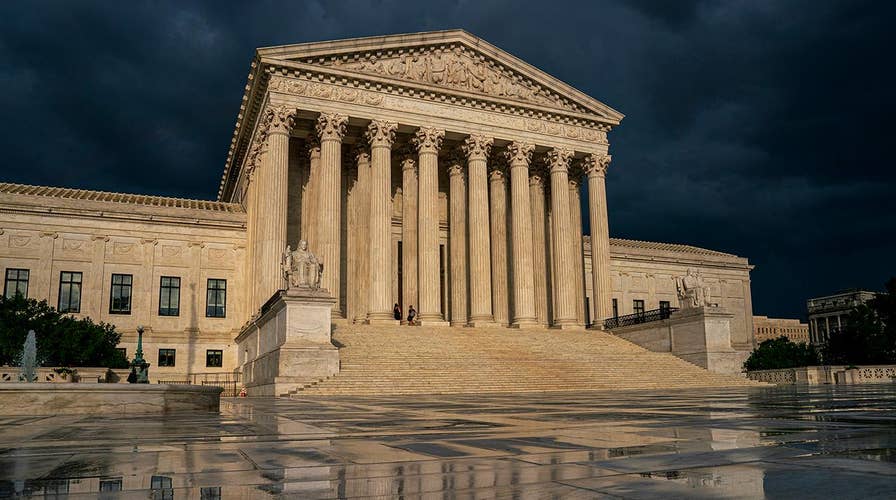Supreme Court watchers await some of the biggest decisions of the term
High court set to issue decisions on gerrymandering and census citizenship questions; Shannon Bream reports from the Supreme Court.
President Trump's two Supreme Court picks, Justices Neil Gorsuch and Brett Kavanaugh, were on opposing sides once again Monday in a case centering on whether a law that slaps harsher penalties on certain gun possession cases is unconstitutionally vague.
Gorsuch sided with liberal justices in a 5-4 decision in United States v. Davis, for which he wrote the opinion of the court. The law in question calls for longer sentences when a person uses a firearm in connection with a "crime of violence," which is defined as a felony "that by its nature, involves a substantial risk that physical force against the person or property of another may be used in the course of committing the offense." That definition is rather confusing, Gorsuch said.
SUPREME COURT STRIKES DOWN BAN ON SCANDALOUS TRADEMARKS, IN DISPUTE OVER 'FUCT' CLOTHING LINE
"Even the government admits that this language ... provides no reliable way to determine which offenses qualify as crimes of violence and thus is unconstitutionally vague," he wrote. Vague laws leave it to unelected attorneys and judges to determine what acts qualify as crimes, Gorsuch said, when it is really Congress' job to make that decision with the laws that they pass.
In the current case, Maurice Davis and Andre Glover were convicted of robbery and conspiracy to commit robbery under the Hobbs Act, which covers robbery, attempted robbery, or extortion affecting interstate commerce. They were each hit with longer sentences because robbery and conspiracy were found to be "crimes of violence." An appeals court found that the clause in the statute defining crimes of violence was unconstitutionally vague.
The Supreme Court's opinion referred to two recent cases where they struck down similar laws for being too vague. In those cases, when determining if a crime qualified as a "violent felony" or "crime of violence," courts had to look at an "ordinary case" of such a crime, as opposed to what happened in the case in question.
The government argued that the courts should look at the specific case instead, but Gorsuch argued that an examination of the statute's text and history shows that Congress did not have a case-specific approach in mind. Therefore, he claimed the law is unconstitutional because it is too vague.
Kavanaugh penned a scathing dissent, where he was joined by the other conservatives. He warned of the repercussions the court's ruling could have.
"The Court’s decision today will make it harder to prosecute violent gun crimes in the future," Kavanaugh wrote. "The Court’s decision also will likely mean that thousands of inmates who committed violent gun crimes will be released far earlier than Congress specified when enacting §924(c)."
Kavanaugh addressed the two recent cases Gorsuch referenced where laws were held to be vague, saying those laws applied to gun cases where defendants had committed violent crimes in the past. The law in the current case adds harsher sentences for the same offense where the gun was used. As a result, he claimed, it makes sense to look at the specific offense.
"Why would we interpret a federal law that criminalizes current-offense conduct to focus on a hypothetical defendant rather than on the actual defendant?" he asked, calling this a "gaping hole" in the majority's analysis.
SUPREME COURT REJECTS EARLY CHALLENGE TO TRUMP STEEL TARIFFS
This case is the latest in several this term where Kavanaugh and Gorsuch were at odds in close decisions.
Gorsuch sided in May with the court's liberal wing, giving a narrow majority in support of a Native American man convicted for hunting in a national forest. Kavanaugh opposed the ruling. A week earlier, Kavanaugh sided with liberals in a 5-4 decision that he wrote, ruling that Apple could be sued by iPhone owners over high prices in their App Store. Gorsuch opposed the ruling.
Fox News' Adam Shaw contributed to this report.





